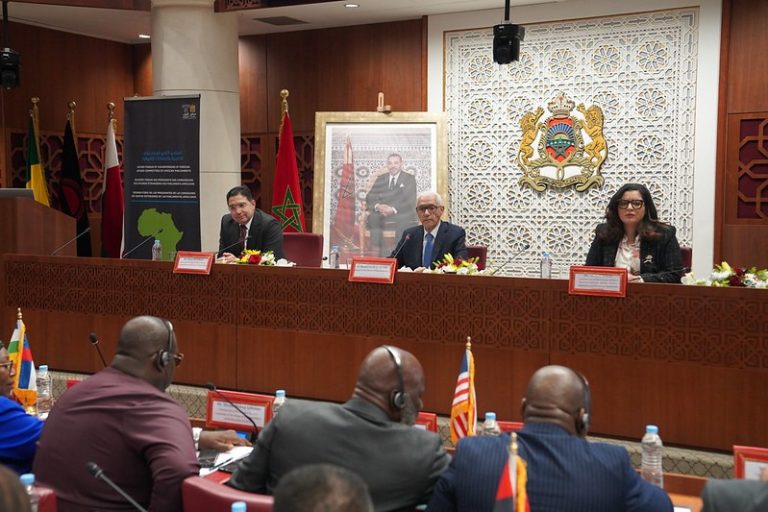Rabat: Prospects of African Renaissance in the Face of Challenges and Global Changes
Editorial: Africa Eye
The Moroccan Parliament hosted an important parliamentary meeting, bringing together the heads of foreign affairs committees from the parliaments of African countries, to discuss the strategic issues facing the continent and the recurring challenges hindering its development. This meeting follows the summit of the Presidents of Parliaments of the Atlantic African countries, recently held in Rabat, in a context that emphasizes the growing role of parliamentary diplomacy in strengthening ties between African countries and coordinating visions to face common challenges.
Despite the multiplicity of initiatives aimed at enhancing continental integration, Africa continues to face recurring challenges, necessitating increased efforts to anchor its emergence. Discussions focused on the security risks shaking the continent, particularly internal conflicts, separatist tendencies, terrorism, and extremism, the repercussions of which not only threaten state security but also contribute to regional destabilization and hinder sustainable development efforts.
Economically, Africa aspires to achieve a growth rate of 4.3% by 2025, leveraging its vast natural and human resources. However, climate change, including desertification, droughts, and floods, casts a shadow over food security, exacerbating poverty, food dependence, and forced migration.
Nevertheless, despite these multiple challenges, positive indicators emerge, reflecting the ability of many African countries to make tangible progress in economic development and democratic transition, relying on their own resources, free from dependency. The international experience, particularly the European experience, shows that continents that have gone through long periods of fragmentation and conflict were able, through unity and integration, to achieve prosperity and development. Africa could achieve the same if it unites its visions and effectively utilizes its potential.

In this context, participants emphasized the importance of strengthening continental partnerships by activating the African Continental Free Trade Area, supporting strategic projects such as the Nigeria-Morocco-Europe gas pipeline, and regional integration initiatives, which are considered essential levers for achieving economic integration and development. They also stressed that Africa, now at the center of international competition, possesses the economic resources, strategic positioning, and qualified human resources to be the “Continent of the Future,” provided it unites efforts and implements the political will to transform aspirations into tangible realities.
In conclusion, the greatest challenge facing Africa is to overcome the legacy of the past and engage in building a future based on self-confidence and strengthening continental decision-making independence. As His Majesty King Mohammed VI emphasized: “Africa must today place its trust in Africa,” and this trust must be the cornerstone of redefining the path towards sustainable development, continental integration, and African leadership on the international stage.
-

Algeria Set to Receive Advanced Russian Su-34M Fighter Jets
Edited By: Widad Wahbi According to an article on The Defense Post, Russia has begun production of the supersonic Su-34M fighter... Geopolitical Analysis -

Northeastern CAR: Female Lion Photographed After Six Years, Marking a Key Step in Population Recovery
Edited By : Fatomatou konèThe Wildlife Conservation Society (WCS) captured a significant photograph of a female lion in northeastern Central... Environment -

Algeria – France: “Libération” reveals the behind-the-scenes role of the Rector of the Great Mosque of Paris
Edited By: Africa EyeIn a detailed investigation published last Friday, the French daily Libération shed light on the discreet yet... Politics -

Adriatic Sea: On the Frontline of a Silent Invasion
Edited By: Africa Eye Beneath the shimmering blue waters of the Adriatic Sea, a subtle but profound ecological shift is taking... Environment -

France issues international arrest warrant for former Algerian diplomat over opposition figure kidnapping
Edited By : Africa Eye with AgenciesA French judge has issued an international arrest warrant for a former diplomat at... Politics -

Giant Puppet Animals Complete Symbolic Climate Journey from Congo to Arctic
Edited By : Fatomatou konèA unique climate awareness initiative concluded this week as The Herds a collection of life-sized puppet... Environment

 Follow the latest news on WhatsApp
Follow the latest news on WhatsApp  Follow the latest news on Telegram
Follow the latest news on Telegram  Follow the latest news on Google News
Follow the latest news on Google News  Follow the latest news on Nabd
Follow the latest news on Nabd 


















